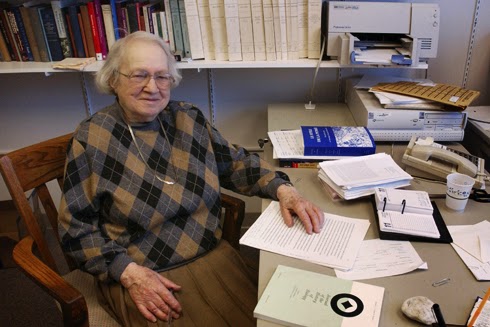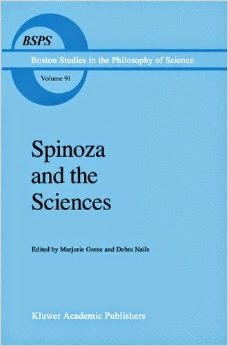Marjorie Grene (1910 – 2009) bundelde Spinoza (en maakte een vergelijking tussen Sartre en Spinoza)

De Amerikaanse biologe en filosofe die studeerde bij Heidegger, Jaspers, Alfred North Whitehead e.a., die aardig wat publiceerde, vooral op het punt van het verstaan van wat leven is en waarin het verschilt van niet-leven (cf. wiki cf. New York Times), schreef voor zover ik kan ontdekken geen monografie of artikel over Spinoza, maar redigeerde wel tweemaal een bundel over hem. Je komt die af en toe tegen, onlangs weer bij het maken van het blog over Wallace I. Matson. Met dit blog wil ik vooral de artikelen/hoofdstukken vermelden die daarin gebundeld werden. Aan het eind citeer ik een opmerkelijke tekst van haar over Spinoza met wie ze Sartre vergeleek.
Het gaat om deze boeken:
Marjorie Grene (Ed.), Spinoza: A Collection of Critical Essays. Garden City, N.Y.: Anchor Books, 1973 [2nd Notre Dame, Ind.: University of Notre Dame Press, - Modern studies in philosophy, 1978]

Table
of contents [cf.]
Behind the geometrical method / H. A. Wolfson
Experience in Spinoza's theory of knowledge / E. M. Curley [PDF]
Spinoza and language / David Savan [ook in Kashap]
Language and knowledge in Spinoza / G. H. R. Parkinson
Spinoza's theory of knowledge in the ethics / Guttorm Fløistad
Substance and its modes / H. F. Hallett
Essence and the distinction of attributes in Spinoza's metaphysics / Alan
Donagan
Spinoza's letter on the infinite / Martial Gueroult
The ontological argument in Spinoza ; The ontological argument in Spinoza :
twenty years later / William A. Earle
Eternity and sempiternity / Martha Kneale
Spinoza's proof of immortality / Alan Donagan
Spinoza and the theory of organism / Hans Jonas
The two eyes of Spinoza / Leszek Kolakowski
Spinoza and the idea of freedom / Stuart Hampshire
Spinoza's account of imagination / R. G. Blair
Action and passion : Spinoza's construction of a scientific psychology / Marx
Wartofsky
Spinoza's moral philosophy / E. M. Curley [PDF]
Spinoza and the political problem / Hilail Gildin.
 Majorie Grene & Debra Nails (Eds.), Spinoza and the Sciences. Springer Science & Business Media,
1986 – books.google
Majorie Grene & Debra Nails (Eds.), Spinoza and the Sciences. Springer Science & Business Media,
1986 – books.google
Table
of contents
MARJORIE GRENE / Introduction
I. SPINOZA AND SEVENTEENTH CENTURY SCIENCE
NANCY MAULL / Spinoza in the Century of Science
ANDRE LECRIVAIN / Spinoza and Cartesian Mechanics
HEINE SIEBRAND / Spinoza and the Rise of Modem Science in the Netherlands
II. SPINOZA: SCIENTIST
DAVID SAVAN / Spinoza: Scientist and Theorist of Scientific Method
ALEXANDRE MATHERON / Spinoza and Euclidean Arith-metic: The Example of the
Fourth Proportional
III. SPINOZA AND THE HUMAN SCIENCES: POLITICS AND HERMENEUTICS
JOSEPH AGASSI / Towards a Canonic Version of Classical Political Theory
RICHARD H. POPKIN / Some New Light on the Roots of Spinoza's Science of Bible
Study
IV. SCIENTIFIC-METAPHYSICAL REFLECTIONS
J. THOMAS COOK / Self-Knowledge as Self-Preservation?
GENEVIEVE LLOYD / Spinoza's Version of the Eternity of the Mind
V. SPINOZA AND TWENTIETH CENTURY SCIENCE
HANS JONAS / Parallelism and Complementarity: The Psycho-Physical Problem in
Spinoza and in the Succession of Niels Bohr
JOE D. VAN ZANDT / Res Extensa and the Space-Time Continuum
MICHEL PATY / Einstein and Spinoza
VI. BIBLIOGRAPHY
DEBRA NAILS / Annotated Bibliography of Spinoza and the Sciences
Marjorie Grene eindigde haar inleiding op dit boek aldus:
"In short, while Spinoza contributed to the advance of scientific knowledge neither laws of refraction, nor gas laws, let alone the law of gravitation for which, it seems, the world was waiting, his relation to the sciences, both then and now, is rich and varied. The metaphysical foundations necessary to support an adequate scientific method, the vision of a unified science entailed by such foundationist propositions, the criticism and, partly, correction of Cartesian physical theory, original use of the mathematical tradition, anticipations of twentieth century doctrines of space and time, the application of a complex investigative method in the emerging field of scientific hermeneutics: all these features are to be discovered when we look at Spinoza in the context of the history of the sciences, from his own time to ours." [Vetdruk van SV]
Sartre vergeleken met Spinoza
Majorie Grene was een der eersten die het denken van Sartre en andere
existentialisten bij het Amerikaanse publiek bekend maakte. In haar artikel Marjorie
Grene, "Sartre's Theory of the Emotions," [in: Yale French Studies, No. 1, Existentialism. (1948), pp. 97-101 - PDF],
maakte ze aan het eind ineens een vergelijking tussen Sartre en Spinoza. Die
passage past heel goed in dit blog:
The revolutionary character of this [Sartre’s] conception appears if one looks at what is in a very real sense the philosophic system of the modern European tradition: the grand expression of the supremacy of reason, i.e. the Ethics of Spinoza. Despite the obvious difference between instruments and efficient causes, there is a strange resemblance, in a way, between Sartre’s technical world with its indefinite series of instrumental causation and Spinoza’s system of mediate finite modes linked in an infinite series of mechanical causes. And in each case this apprehension within an infinite series of organized cause and effect relations is supplemented by a more direct understanding of anti through wholes. But how different in all its human and metaphysical implications is Sartre's mass-movement of magical understanding from the unification of Spinoza's world in the third kind of knowledge. It is a principle entirely at variance with reason and formal cause that, in Sartre's account, supplements the world of utensils. Yet it is, perhaps, a principle of more direct and ample human significance, for us at least, than the reason that found its most perfected philosophic expression in the Ethics.
On the other hand, there is always the suspicion, with Sartre's theories, that they are a bit too apt-or at least too clever, in a flashy way, to be quite true. In this case at least, as Sartre himself says, there is the necessity of trying to apply this definition of emotion to the analysis of other examples. In particular, for example, there is the question of how what Sartre apparently calls sentiments are related to emotions: that is, long-time, continuous emotional attitudes which appear to sustain the world rather than transform it.
______________
Marjorie Grene´s cv [PDF]
In Memoriam: Marjorie Grene, Honorary University Distinguished Professor of Philosophy and professor emerita [cf. en cf.]
Apart noemenswaard is nog:
Marjorie Grene, The Knower and the Known. University of California Press, 1974 – books.google
Haar foto van Virginia Tech's In Memoriam: Marjorie Grene, Honorary University Distinguished Professor of Philosophy and professor emerita.
Interview with Marjorie Grene, the ninety-four-year-old professor emerita of philosophy at Virginia Tech [cf.]

